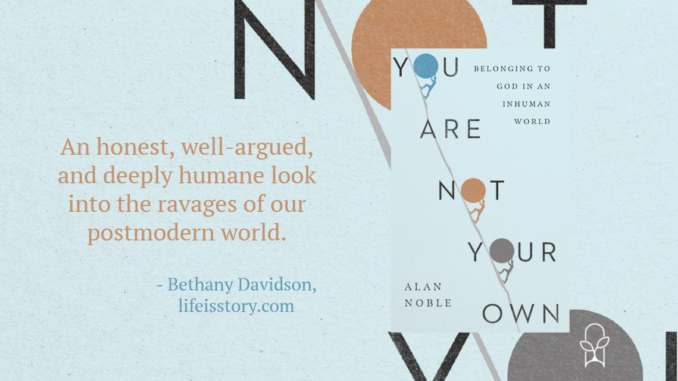
Also by this author: On Getting Out of Bed: The Burden and Gift of Living
Published by IVP on October 12, 2021
Genres: Non-Fiction, Christian Life, Theology, Work
Buy on Amazon
Goodreads

"You are your own, and you belong to yourself." This is the fundamental assumption of modern life. And if we are our own, then it's up to us to forge our own identities and to make our lives significant. But while that may sound empowering, it turns out to be a crushing responsibility--one that never actually delivers on its promise of a free and fulfilled life, but instead leaves us burned out, depressed, anxious, and alone. This phenomenon is mapped out onto the very structures of our society, and helps explain our society's underlying disorder. But the Christian gospel offers a strikingly different vision. As the Heidelberg Catechism puts it, "I am not my own, but belong with body and soul, both in life and in death, to my faithful Savior Jesus Christ." In You Are Not Your Own, Alan Noble explores how this simple truth reframes the way we understand ourselves, our families, our society, and God. Contrasting these two visions of life, he invites us past the sickness of contemporary life into a better understanding of who we are and to whom we belong.
“I am not my own, but belong with body and soul, both in life and in death, to my faithful Savior Jesus Christ.”
This provocative, well-argued book presents a solid case for why the words of the Heidelberg Catechism ring truer than we can imagine in our modern age. Our society pressures us to achieve, tells us that we alone can fulfill our goals and give ourselves identities, and plies us with endless, exhausting techniques and self-medication tools to help us cope with the inevitable costs of our inhuman environment. Alan Noble summarizes philosophical and cultural movements, provides detailed illustrations from published works, his own life, and others’ stories, and encourages his readers to consider the chains that we feel in our constant pursuit of freedom through self-definition and self-validation.
I particularly appreciated Noble’s reflections on how our culture’s obsessions with achievement, measurable outcomes, and self-identity cause people to either fight harder or just give up. He relates this to the Gen Z college students he teaches, arguing that these depressed, anxious, and miserable young adults aren’t weak or lazy, but are dealing with the consequences of an inhuman world. They have had to fight for success their whole lives, and struggle to have any sense of self-worth or stability outside of achievement. He also reflects that most people, no matter how successful or well-adjusted they seem, have griefs, traumas, and terrors beyond what we would ever assume of them or perhaps imagine possible. He urges people to look beyond optimistic views of modern society and recognize how even our advancements add to the stresses and demands that people must bear up under.
Deep and Insightful
You Are Not Your Own: Belonging to God in an Inhuman World is a heavy read at times, but well worth it. I grew up in a counter-cultural way and skipped out on a lot of common social messages, partly because my parents didn’t let me watch Disney movies when I was young. By the time that I watched time-honored and questionable classics like The Little Mermaid, I was mature enough to deconstruct their cultural liturgies and associated baggage. I was always cynical about the prospect of finding happiness by being “true to yourself,” and I roll my eyes dramatically at any movie line that tells someone to follow their heart. Still, even though I didn’t need to be convinced of Noble’s diagnoses of the world, this book helped me consider more complex and less overt ways that “the Responsibilities of Self-Belonging” drive our harried, never-enough culture.
My one critique is that I would have liked more practical suggestions for how Christians can live out their commitments in embodied ways, going against the cultural grain around them. I respect the author’s choice to focus on mostly intangible elements and give fewer practical suggestions, since the idea of life hacks goes against his whole premise and there is no way for us to alter the course of our postmodern world. However, I wasn’t looking for life hacks, or more endless ways to optimize. As much as I appreciated his intellectually sound and philosophically engaging conclusion, I think he could have offered more ideas for how Christians can recapture older spiritual practices and life patterns that would help them say no to conformity with modern culture’s demands and burdens. Otherwise, people may put down this book and think that they can’t change anything concrete about their lives.
Recommendation
This book gave me a lot to think about regarding both social issues and my own life. I would recommend it to anyone interested in social critique, regardless of their worldview. Even if someone finishes You Are Not Your Own without agreeing that the answer to our deepest struggles is to belong wholly to God and find ourselves in Him, they will have lots to contemplate from the diagnoses and perspectives here. I found this book very insightful and helpful, especially in its unfiltered honesty about the toll that social norms take on people’s mental health and ability to function, regardless of actual biochemical variances or predispositions to specific disorders. Alan Noble provides an honest, well-argued, and deeply humane look into the ravages of our postmodern world, and I fully anticipate reading this again in the future to absorb even more from it.
